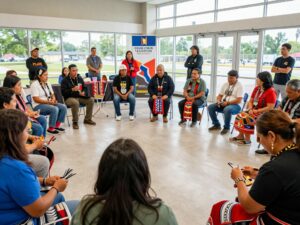News Summary
The acting U.S. attorney, Ed Martin, has criticized the CHEST Journal for potential partisan bias, raising alarms about scientific integrity. His letter has sparked backlash from advocacy groups, warning of government overreach that threatens academic freedom and diversity in research. In response, students from Georgetown Law have rallied against these pressures, emphasizing the importance of diversity, equity, and inclusion in academia. The unfolding tension poses significant implications for the future of scholarly inquiry and the impact of government influence on educational institutions.
U.S. Attorney Caught in Controversy Over Editorial Independence of CHEST Journal
The acting U.S. attorney for the District of Columbia, Ed Martin, has fired a notable shot across the bow of the CHEST Journal, a prominent publication in the medical community. In a pointed letter to the editors, Martin raised alarms regarding the journal’s editorial practices, hinting at a perceived partisan bias that could endanger the integrity of scientific discourse.
Editorial Integrity Under Fire
In his correspondence, Martin questioned the journal’s mechanisms for safeguarding the public from misinformation and whether it genuinely fosters diverse viewpoints in its publications. As the academic world bristles at such implications, concerns have emerged regarding potential suppressive effects on academic and scientific freedom. A coalition of First Amendment advocates and scientists has noted the chilling effect such a letter might impose upon researchers and scholars who strive to present critical analyses, particularly those that may contradict prevailing government narratives.
Reactions from Advocacy Groups
The Foundation for Individual Rights and Expression has sharply criticized Martin’s letter, labeling it as an unusual and unwarranted threat, especially emanating from a position associated with law enforcement. Critics have suggested that Martin’s actions signal an alarming trend of government overreach wherein individuals who voice dissenting opinions may be subjected to scrutiny or intimidation by the state. They have warned that such actions could lead to an environment where academic exploration and criticism of government policy are profoundly diminished.
History of Tensions in Science Funding
The backdrop of this conflict cannot be divorced from the broader landscape of scientific funding under the previous administration, which featured drastic cuts to key agencies like the Health and Human Services Department and the National Institutes of Health. These funding challenges were speculated to be ideologically driven, targeting research areas that did not align with governmental stances. This fractious climate raises questions about the future of scientific inquiry and the degree to which government influence can shape the trajectory of research.
Internal Discontent Among Federal Prosecutors
Recent reports have surfaced illustrating discord within the federal justice system itself, as evidenced by the resignation of federal prosecutor Denise Cheung. Cheung’s departure followed directives from Trump-appointed officials to pursue actions with questionable legal grounds, including a call for a criminal investigation tied to a federal contract associated with the Biden administration. Such instances contribute to the impression of a justice system under duress, exacerbated by increasing pressure to align with particular political agendas.
The Local Response: Georgetown Law Students Rally
In the wake of these contentious developments, the Coalition for Justice, formed by Georgetown Law students, has publicly banded together to denounce Martin’s demands related to Diversity, Equity, and Inclusion (DEI) programs within academic institutions. Students expressed unease regarding the implications of such pressures on their education and career trajectories, fearing that the climate fostered by Martin’s actions could limit their opportunities in federal employment.
Academic Freedom at Stake
Georgetown Law’s Dean has affirmed the university’s commitment to academic freedom, denouncing the intrusion into its operational ethos. In light of these pressures, many students articulated their belief that DEI initiatives are not mere supplementary programs but vital components of their educational journeys, contributing significantly to their overall success and professional development.
Concerns About Future Implications
This ongoing saga may have far-reaching ramifications, particularly in a legal educational landscape that has already seen a decline in the enrollment of Black students following a recent Supreme Court ruling against affirmative action. The interconnectedness of these issues has prompted law students to fortify their resolve against perceived authoritarian actions from the government, underscoring a widespread desire for a more inclusive and equitable academic environment.
As the tension between academic integrity and governmental pressure continues to unfold, the implications for future generations of scholars and professionals remain uncertain. The intersection of these pivotal issues will undoubtedly engage legal communities and civil rights advocates as the quest for academic independence and scientific freedom intensifies.
Deeper Dive: News & Info About This Topic
HERE Resources
Additional Resources
- NBC News: Denise Cheung Resignation from U.S. Attorney’s Office
- The Georgetown Voice: Georgetown Law Students Rally Against U.S. Attorney Martin
- NBC News: Ed Martin’s Alleged Abuse of Power
- Foundation for Individual Rights and Expression: Protecting First Amendment Rights
- Wikipedia: Diversity, Equity and Inclusion
Author: STAFF HERE CHARLESTON
The CHARLESTON STAFF WRITER represents the experienced team at HEREcharleston.com, your go-to source for actionable local news and information in Charleston, Charleston County, and beyond. Specializing in "news you can use," we cover essential topics like product reviews for personal and business needs, local business directories, politics, real estate trends, neighborhood insights, and state news affecting the area—with deep expertise drawn from years of dedicated reporting and strong community input, including local press releases and business updates. We deliver top reporting on high-value events such as the Spoleto Festival USA, Charleston Wine + Food Festival, and the MOJA Festival. Our coverage extends to key organizations like the Charleston Metro Chamber of Commerce and the Charleston Museum, plus leading businesses in tourism and maritime industries that power the local economy such as South Carolina Ports Authority and the Charleston Visitor Center. As part of the broader HERE network, including HEREaiken.com, HEREbeaufort.com, HEREchapin.com, HEREcharleston.com, HEREclinton.com, HEREcolumbia.com, HEREgeorgetown.com, HEREgreenwood.com, HEREgreenville.com, HEREhiltonhead.com, HEREirmo.com, HEREmyrtlebeach.com, HEREnewberry.com, HERErockhill.com, HEREspartanburg.com, HEREaustin.com, HEREcollegestation.com, HEREdallas.com, HEREhouston.com, and HEREsanantonio.com, we provide comprehensive, credible insights into South Carolina's dynamic landscape.










